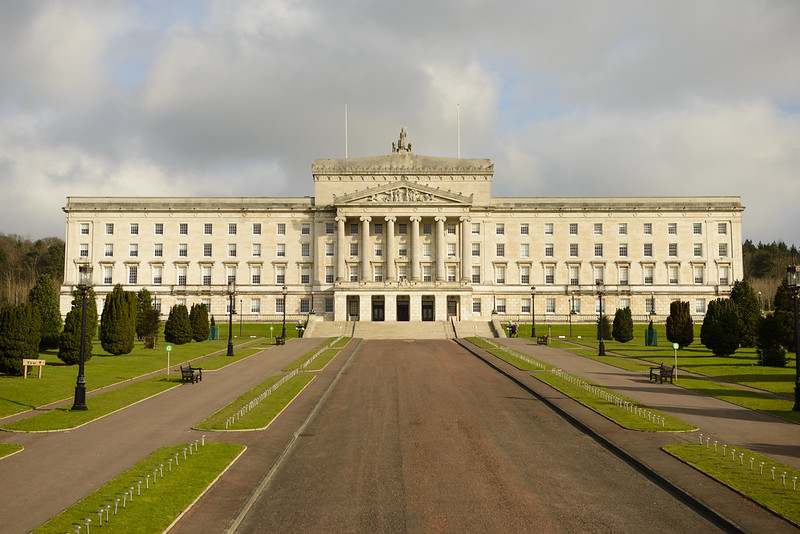Can Northern Irish parties and the British government learn from Belgium’s ‘waffle iron’ politics?
The UK government and Northern Irish politicians need to take a leaf out of the Belgian practice of ‘waffle iron’ politics, says Dr Elodie Fabre.

Edwin Poots MLA’s tenure as leader of the DUP lasted less 3 weeks. He resigned the same day he nominated Paul Givan MLA as First Minister of Northern Ireland, which was to be the foundational act of his leadership and the start of the DUP’s new approach to dealing with the Northern Ireland Protocol. He felt he had to resign because a majority of his MLAs and MPs were dissatisfied` with the deal he and Givan agreed to with Sinn Féin and the British Government over the return of devolved institutions. To make sure that Sinn Féin would nominate a Deputy First Minister when Edwin Poots nominated Paul Givan, the British government, via the Secretary of State (SoS) for Northern Ireland Brandon Lewis, agreed to implement the linguistic and cultural package of the New Decade New Approach (NDNA) if the Northern Ireland Assembly failed to legislate on this matter.
DUP elected representatives, as well as many Unionists, were unhappy that the British government ‘gave in’ to Sinn Féin’s demand to implement a specific section of NDNA to make sure they would not collapse the institutions as they did in 2017. The cultural-linguistic package includes recognition for the Irish Language, as well as recognition for Ulster Scots. However, neither Paul Givan nor Ulster Scots are sufficiently popular among Unionists to make it look like each side (Unionist and Nationalist) got an equal share of the deal. Perhaps the UK government and all Northern Irish politicians need to take a leaf out of the old Belgian practice of ‘waffle iron’ politics.
Waffle iron politics was a strategy that involved spending equally for each language community in Belgium (Walloons/French-speakers and Flemish/Dutch-speakers). The very Belgian use of the image of a waffle iron comes from the fact that the waffle iron consists of two symmetrical parts that spread the dough equally in each half. In practical terms, this meant that public spending was equal in each region, irrespective of needs and population differences. This practice ended with the federalisation of the country, when regions became in charge of the most significant redistributive policies, but the principle as a conflict-solving approach remains: to achieve peace and stability, make sure to give in equal measure to each community.
To a degree, this already happens in Northern Ireland. The division of education into state schools and Catholic schools, each with its own teaching training programme, is one way to make sure that each community is well provided for. Like Belgian waffle iron politics, this model is far from being the most economically efficient. Likewise, community spending on culture (some public funding for an Chultúrlann and for the Museum of Orange Heritage, for Féile an Phobail and for marching bands) tries to make sure that each community’s cultural expression is funded. In a broader sense, the DUP’s perception of the situation as Sinn Féin and the Nationalist community getting something while they and their community did not, shows how engrained this way of thinking already is in Northern Ireland.
But waffle iron politics was predominantly a central government strategy, and the British government would do well to take a leaf out of the Belgian rulebook, also considering matters that go beyond financial resources. The British government and the Secretary of State need to think beyond the immediate crisis and remember that if they give to one community, they must consider how this will play with the other community and what to give to them in return. For instance, if the SoS agrees to a package that meets the demands of one community, then what can they ‘give’ to the other? This needs to become a greater part of the British government’s approach to addressing Northern Ireland’s problems on a day-to-day basis. Brandon Lewis and the Northern Ireland Office should have understood that a return of devolution would not be a sufficient unionist win compared to the recognition of the Irish language, irrespective of the intrinsic merits of recognising a minority language.
The DUP would probably argue that they want the Northern Ireland Protocol scrapped, but the Protocol may be considered as the other side of the waffle iron to their victory over Brexit. This therefore raises the question of what it is that they would want from NDNA: extra police officers, education reform and an anti-poverty strategy that would benefit many in the Unionist community? This will require the DUP to set out what they want besides a ‘perfect’ Brexit and to develop a strategy for strengthening the Union that goes beyond fighting against the Protocol and the rights of Irish speakers.
Indeed, for waffle iron politics to work, there needs to be demands on both sides and a recognition that stability requires that both sides must come out of the table having achieved something. Edwin Poots overestimated the attractiveness of an Executive led by Paul Givan to his own community, and fundamentally it is policy that matters for Unionists, Nationalists, and the great forgotten of waffle iron politics, the growing number of people who would rather not think about constitutional issues.
The featured image has been used courtesy of a Creative Commons license.




